A remnant of a world long gone
Kalimera, Americentric nonsense-obsessed election junkies curious folks who are always eager to learn something new about the surrounding world! Here's the story of Mount Athos in Greece. It's a place where women are not allowed, and non-Orthodox men can stay for no more than one day and one night. Those are the rules of the autonomous hermit republic of Holy Mountain at Athos, one of the three sub-branches of the Halkidiki peninsula in Northern Greece. The place has been like a magnet for devout Orthodox Christian pilgrims from around the world for many centuries. And it's probably the last remaining anachronistic remnant of a world that disappeared with the fall of the Byzantine empire.


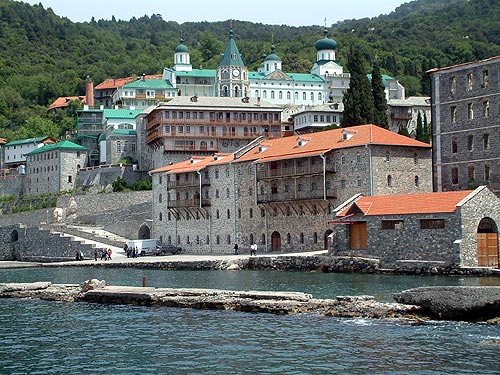
Although those 20 monasteries that make up the Republic of Athos are truly magnificent, if you're looking for luxury, that's not the place for you. And no one expects such a thing. Most visitors are seeking refuge from the hectic modern life of the globalized world, a place for contemplation and meditation. Somewhere "close to God", as they say.
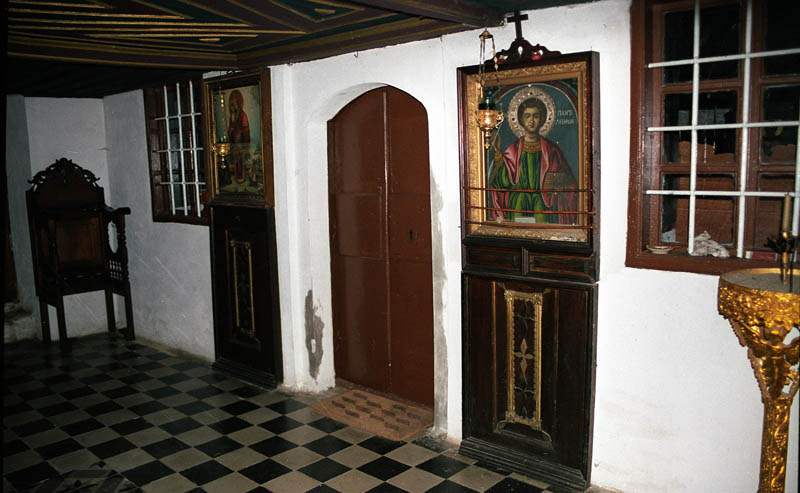
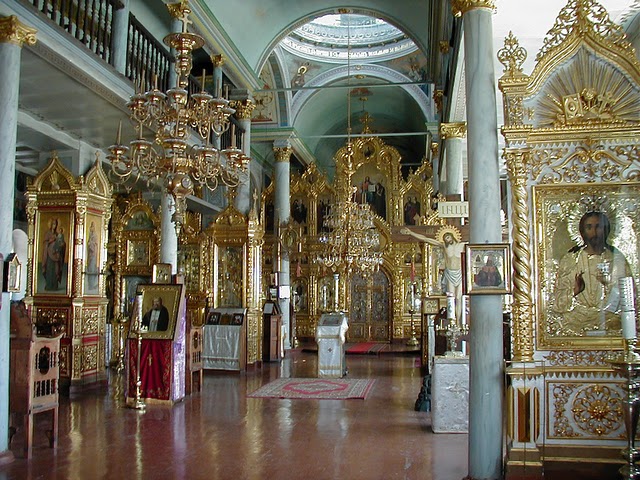
For centuries, the Holy Mountain of Athos has captured the imagination of Orthodox Christians. The tiny rocky peninsula in the Macedonian sector of Greece overlooking the island of Thasos is just 350 sq km large, but it's extremely rich in endemic forests, while being very scarcely populated. Legend says when Virgin Mary was on her way to Europe via Cyprus, she set foot on these shores, and she instantly got enchanted by its beauty. Then God designated Athos as a gift to her. And because the place was meant "only for the purest among all women", no other women have been ever allowed to visit Athos ever since. At least that's the explanation the local monks have been giving ever since the 10th century. It's when the peninsula was granted the special status of a monk republic. Even most female animals have no place there, with the exception of cats! And there are many cats on Athos.

Many times have the EU bureaucrats made attempts to remove the ban that doesn't allow access to women. But the monks persistently cite some Byzantine documents dating back 1000 years, according to which Athos was promised an eternal sovereignty over its domestic matters. And they're guarding their immunity from external influence very jealously. Especially when it comes to the EU. It's a completely different world, one that existed 10 centuries ago: the monks still recite prayers written at the time of the Byzantine emperors, they still use the old Julian calendar... In Daphni, the only place in Athos that somewhat looks like a port, next to the Greek flag one could see the old flag of the Byzantine empire that ceased to exist more than half a millennium ago. Stubbornly, Athos keeps rejecting the outside world in all its forms. And that's probably what attracts so many pilgrims. as long as they aren't women. The number of Athos monks has nearly doubled for the last century, and they're more than 2000 at the moment.
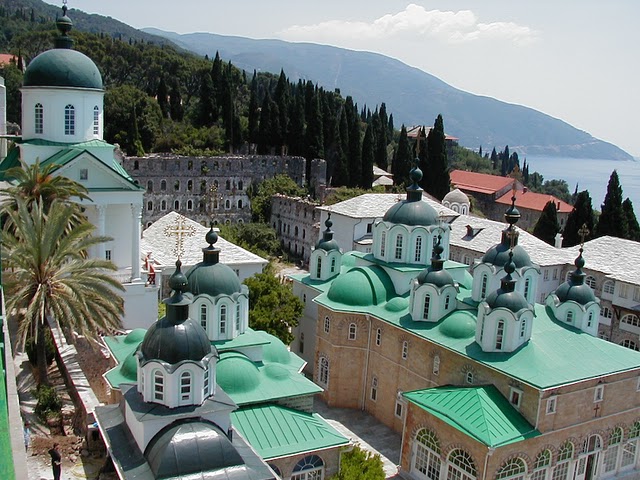
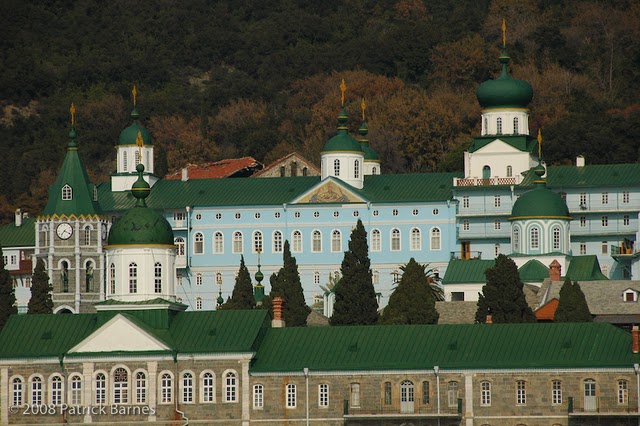
But it's not only believers that have been flocking there in recent times. Many Greeks have started discovering Athos as a place where they could find a refuge away from the crisis. Despite the restrictions, the peninsula is enjoying a unprecedented flood of visitors. Now, it's evident that the monks don't hold the Greek politicians in high regard - be it because of the recent corruption scandal involving some property of the monastery at Vatopedi, or else. See, back in 2005 the abbot of that monastery, Ephraim was involved in some dubious real estate swaps, which he had negotiated with the then prime minister Kostas Karamanlis. The bishop was arrested last year, which prompted the protests of the monks from Holy Mountain. They were convinced the true culprits for the scandal should be sought elsewhere - in Athens. The investigation showed involvement on both sides. Since then, the monks have been even more suspicious about anything remotely related to politics.

Visiting this strange republic is possible after obtaining a special visa. Only 4 non-Orthodox males per day are allowed to enter. There's no road connecting Athos to the mainland, so you have to take a boat. Those who are allowed to stay, should share all the monk activities and respect the strict rules of conduct: waking up in the middle of the night for the first prayer at 4am, sleeping on wooden plank-beds, and a constant battle with the many pests and insects, living in stone cells with no running water and electricity, and no communication with the outer world. Contemplating in the quiet solitude of the unspoilt nature around is considered the ultimate resource of the place. Oh, and lots of hard day's work, like wood-chopping or fixing brick walls.

But now the winds of change are threatening even this remote relic from the past. In their attempts to deal with the financial collapse of their country, the Greek government is ready to lift centuries old taboos. In the future, it's planning that the Orthodox Church, including its many monks on Athos, would have to pay taxes. The Church is the one institution in Greece that possesses the most property around the country. Until now the denizens of the autonomous monk republic were tax exempt. But now this is about to end. The argument is that, since the Greek clergy receive money from the state, they should contribute to the common effort of their society, and tighten the belts like the rest of the Greeks.
As a step in that direction, the plan includes cutting the number of Church employees, imposing property tax on the vast estates of the Greek Orthodox Church, including those 20 monasteries at Holy Mountain. It's still unclear what sort of money we're talking about here, but it's assumed there are several thousand houses, apartments and undeveloped plots of land, many of which sprawl beyond the boundaries of the Athos autonomy.
This way, the Greek state that's been at the brink of default for years, is hoping to add another source of constant revenue to its budget that now resembles a broken bucket. No surprise, the Council of the Athos clergy instantly issued an open letter of protest againt the measure. They argue that the planned tax on the church property equals nationalization. Since 1923 Athos has enjoyed an official status of autonomous district within the Greek state, along with all the big privileges that come with that. There are unique artifacts in those monasteries - books and icons that are virtually priceless. There are no VAT taxes for anything the monks buy for their needs, and technically, Athos is a tax haven (not that there's too much one could buy there, save for the few hand-made icons and souvenirs). Even the EU has recognized this special status when it accepted Greece as a member in 1981.
Back in 2011 when Papandreou's government announced the plan to tax the Church, the monks even threatened to cut any relations with the lefist PASOK government in Athens. That hasn't happened yet, but the relations are strained nevertheless. And the whole corruption fiasco with the Vatopedi monastery didn't help much in that respect, either. But it's obvious that in an ever globalizing world, and in a country in deep financial trouble, the sovereignty of this tiny fragment of the past is about to be shaken severely.


Although those 20 monasteries that make up the Republic of Athos are truly magnificent, if you're looking for luxury, that's not the place for you. And no one expects such a thing. Most visitors are seeking refuge from the hectic modern life of the globalized world, a place for contemplation and meditation. Somewhere "close to God", as they say.


For centuries, the Holy Mountain of Athos has captured the imagination of Orthodox Christians. The tiny rocky peninsula in the Macedonian sector of Greece overlooking the island of Thasos is just 350 sq km large, but it's extremely rich in endemic forests, while being very scarcely populated. Legend says when Virgin Mary was on her way to Europe via Cyprus, she set foot on these shores, and she instantly got enchanted by its beauty. Then God designated Athos as a gift to her. And because the place was meant "only for the purest among all women", no other women have been ever allowed to visit Athos ever since. At least that's the explanation the local monks have been giving ever since the 10th century. It's when the peninsula was granted the special status of a monk republic. Even most female animals have no place there, with the exception of cats! And there are many cats on Athos.

Many times have the EU bureaucrats made attempts to remove the ban that doesn't allow access to women. But the monks persistently cite some Byzantine documents dating back 1000 years, according to which Athos was promised an eternal sovereignty over its domestic matters. And they're guarding their immunity from external influence very jealously. Especially when it comes to the EU. It's a completely different world, one that existed 10 centuries ago: the monks still recite prayers written at the time of the Byzantine emperors, they still use the old Julian calendar... In Daphni, the only place in Athos that somewhat looks like a port, next to the Greek flag one could see the old flag of the Byzantine empire that ceased to exist more than half a millennium ago. Stubbornly, Athos keeps rejecting the outside world in all its forms. And that's probably what attracts so many pilgrims. as long as they aren't women. The number of Athos monks has nearly doubled for the last century, and they're more than 2000 at the moment.


But it's not only believers that have been flocking there in recent times. Many Greeks have started discovering Athos as a place where they could find a refuge away from the crisis. Despite the restrictions, the peninsula is enjoying a unprecedented flood of visitors. Now, it's evident that the monks don't hold the Greek politicians in high regard - be it because of the recent corruption scandal involving some property of the monastery at Vatopedi, or else. See, back in 2005 the abbot of that monastery, Ephraim was involved in some dubious real estate swaps, which he had negotiated with the then prime minister Kostas Karamanlis. The bishop was arrested last year, which prompted the protests of the monks from Holy Mountain. They were convinced the true culprits for the scandal should be sought elsewhere - in Athens. The investigation showed involvement on both sides. Since then, the monks have been even more suspicious about anything remotely related to politics.

Visiting this strange republic is possible after obtaining a special visa. Only 4 non-Orthodox males per day are allowed to enter. There's no road connecting Athos to the mainland, so you have to take a boat. Those who are allowed to stay, should share all the monk activities and respect the strict rules of conduct: waking up in the middle of the night for the first prayer at 4am, sleeping on wooden plank-beds, and a constant battle with the many pests and insects, living in stone cells with no running water and electricity, and no communication with the outer world. Contemplating in the quiet solitude of the unspoilt nature around is considered the ultimate resource of the place. Oh, and lots of hard day's work, like wood-chopping or fixing brick walls.

But now the winds of change are threatening even this remote relic from the past. In their attempts to deal with the financial collapse of their country, the Greek government is ready to lift centuries old taboos. In the future, it's planning that the Orthodox Church, including its many monks on Athos, would have to pay taxes. The Church is the one institution in Greece that possesses the most property around the country. Until now the denizens of the autonomous monk republic were tax exempt. But now this is about to end. The argument is that, since the Greek clergy receive money from the state, they should contribute to the common effort of their society, and tighten the belts like the rest of the Greeks.
As a step in that direction, the plan includes cutting the number of Church employees, imposing property tax on the vast estates of the Greek Orthodox Church, including those 20 monasteries at Holy Mountain. It's still unclear what sort of money we're talking about here, but it's assumed there are several thousand houses, apartments and undeveloped plots of land, many of which sprawl beyond the boundaries of the Athos autonomy.
This way, the Greek state that's been at the brink of default for years, is hoping to add another source of constant revenue to its budget that now resembles a broken bucket. No surprise, the Council of the Athos clergy instantly issued an open letter of protest againt the measure. They argue that the planned tax on the church property equals nationalization. Since 1923 Athos has enjoyed an official status of autonomous district within the Greek state, along with all the big privileges that come with that. There are unique artifacts in those monasteries - books and icons that are virtually priceless. There are no VAT taxes for anything the monks buy for their needs, and technically, Athos is a tax haven (not that there's too much one could buy there, save for the few hand-made icons and souvenirs). Even the EU has recognized this special status when it accepted Greece as a member in 1981.
Back in 2011 when Papandreou's government announced the plan to tax the Church, the monks even threatened to cut any relations with the lefist PASOK government in Athens. That hasn't happened yet, but the relations are strained nevertheless. And the whole corruption fiasco with the Vatopedi monastery didn't help much in that respect, either. But it's obvious that in an ever globalizing world, and in a country in deep financial trouble, the sovereignty of this tiny fragment of the past is about to be shaken severely.